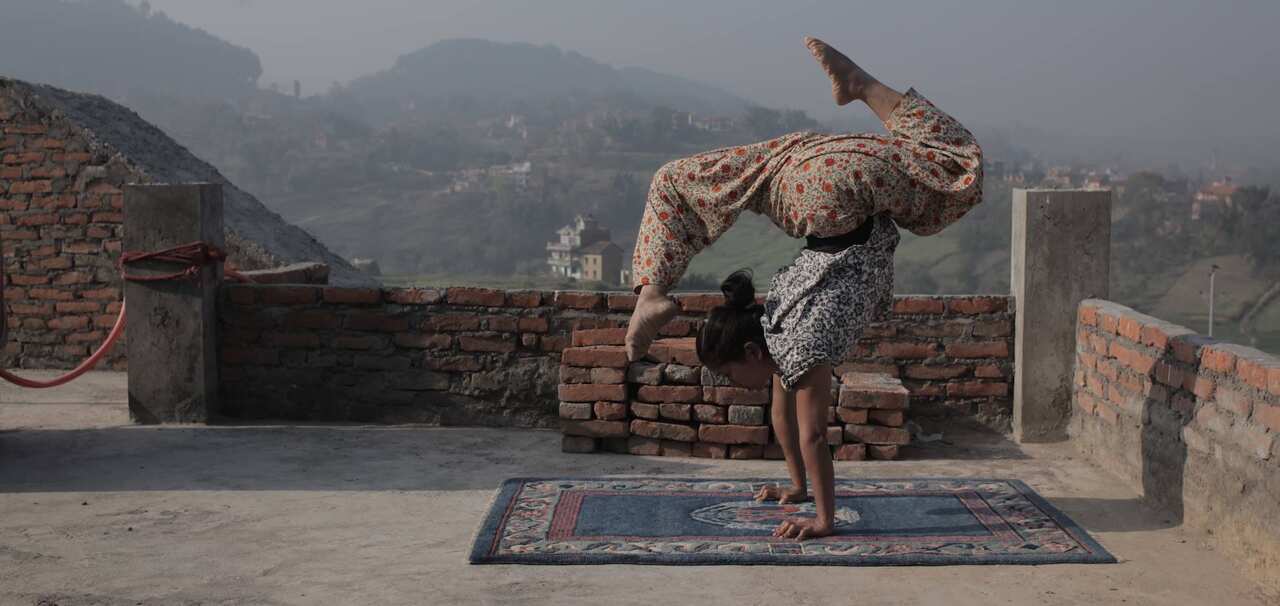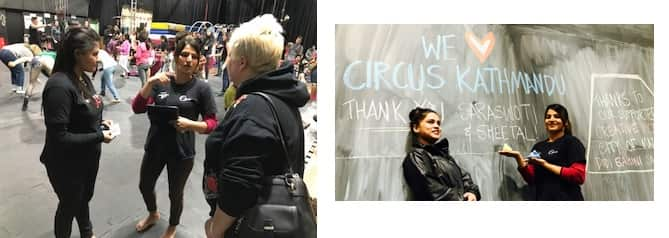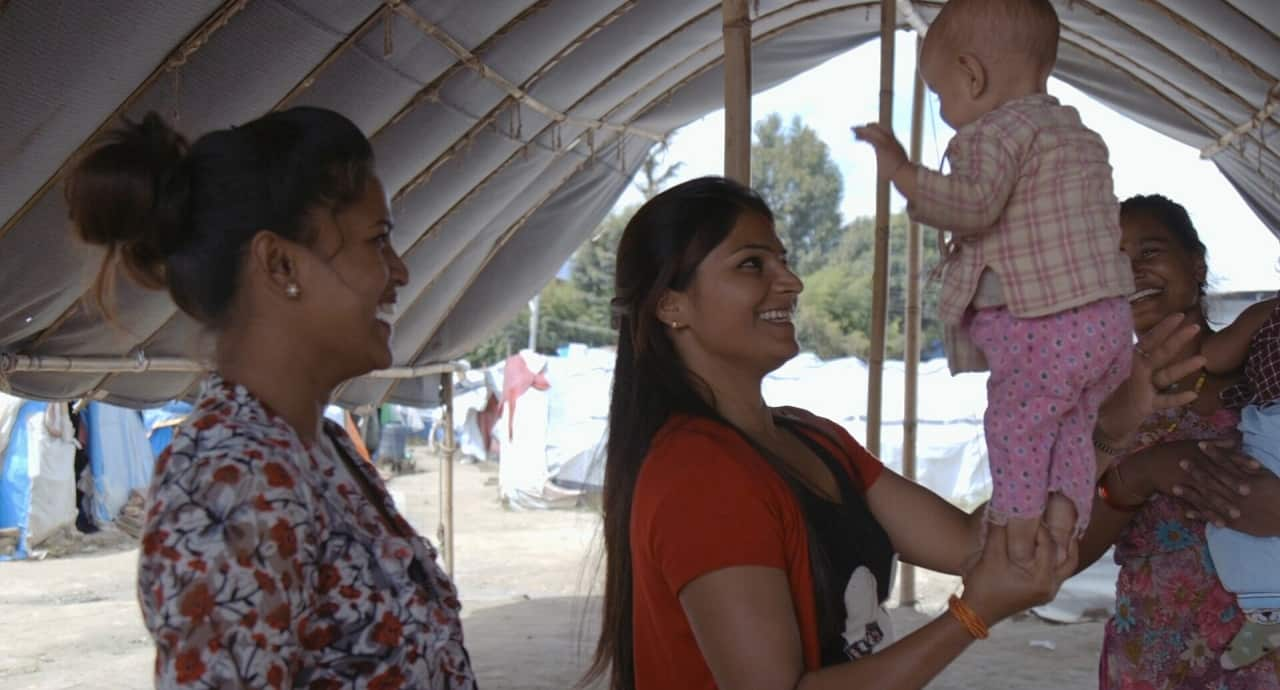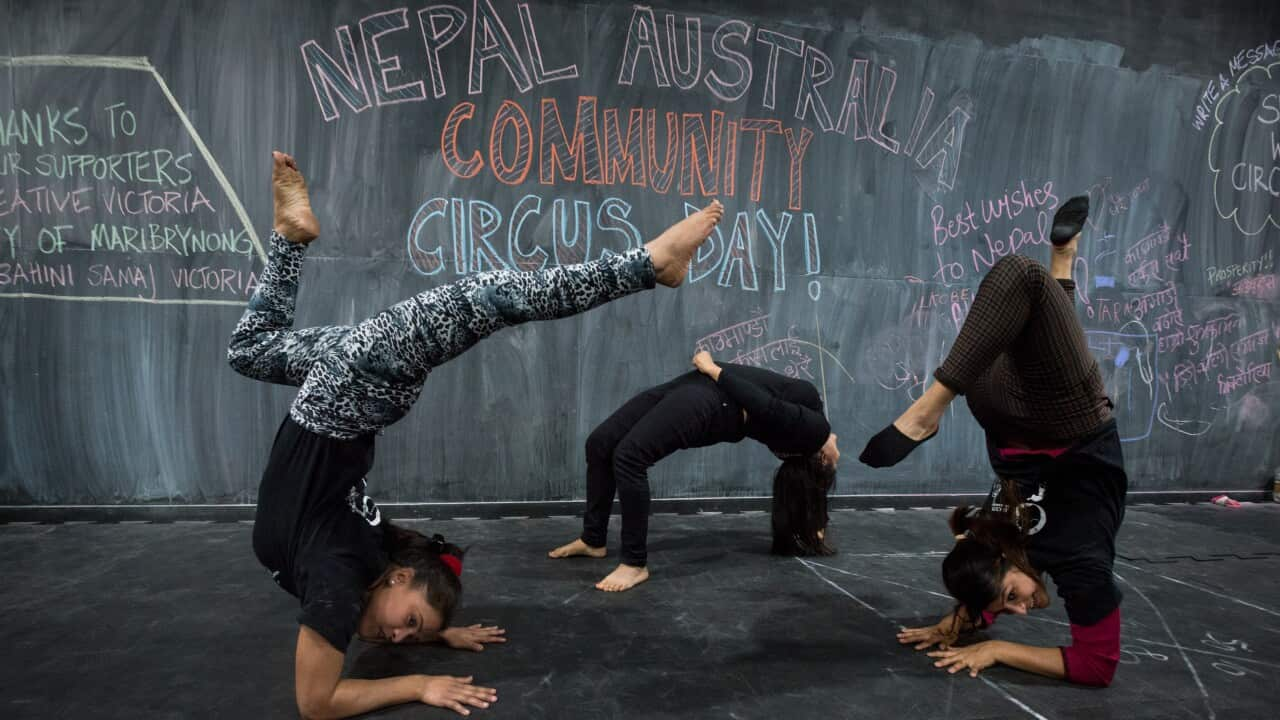You are barely eight years old, and in a blink, your life turns up-side-down.
You are hustled away and trafficked to an unknown land where strangers don't even speak the language of which you have just started learning vernaculars of. You are abused, forced into working in a circus with no visible path of return. Every day, you are pressured to perform dangerous acts - failing to obey the instructions puts you in a hopeless situation, with no help.
Then one day, many years later, in your early adulthood years you are rescued. With no clear idea what's going to happen next, you are thrust into making your own livelihood with the skills you acquired under duress.
"We had no idea that there were different countries, different people,” Sheetal tells SBS Nepali. “To us remaining in the captivity, under duress was our world."
You might think this is a pitch for a movie but it's the true story of Saraswoti Adhikari and Sheetal Ghimire - survivors of child trafficking to Indian circuses across the border from Nepal to India.
Their story, and subsequent rehabilitation is elegantly captured in a documentary film "Even When I Fall", directed by Kate McLarnon and Sky Neal from the UK. It recently had its premiere in Australia thanks to a grassroots level arts organisation – the Women’s Circus – based in the western suburbs of Melbourne.
Shot over six years, the film follows the journey of the two women and the consequences of the rescued survivors, who have little or no education, as they confront the families that sold them. All they know is circus life and the breath-taking skills and performances they have learned. Then together with 11 other young trafficking survivors, they form Circus Kathmandu - the first and only contemporary circus in Nepal.

Saraswati and Sheetal visited Melbourne for the Australian movie premiere and to participate in a creative exchange partnership with the Women's Circus. They says they have changed not only their lives but are keen to help others who have not been as lucky as they have, through circus and performing arts.
One thing both women have its a determination in their eyes and a simple conviction - if you work hard, the work will pave a better way for you. Since being rescued and establishing Circus Kathmandu they have visited many countries, including the UK, Norway, Denmark, the UAE as well as Australia, to showcase their incredible talent and spread their message of hope.
"We were so excited when we flew for the first time" she adds with a twinkle in her eyes.
It is a far cry from their time in captivity, where they were clueless about a world outside the periphery of the circus ring, yet they remain traumatised saying they often feel scared from the “scars of their past.”
"We feel extremely vulnerable at times, especially when it is hard to communicate in a foreign language" adds Sheetal.
‘Educate against modern slavery’
Once they are back in Nepal, Saraswoti and Sheetal are keen to put their learning of kinesics - the art of using body language - to tell the stories in their social workshops rather than through dialogue.
"One can be a teacher, direct a circus based drama and lead a social cause.” Saraswoti says. “We want more and more people to know us, our story and I want to remove the stigma that is prevalent in our society where working in a circus is not seen positively".

Devon Taylor, executive director of Women's Circus, says "We also learned a lot from Sheetal and Saraswoti. They work efficiently with minimal resources, it was amazing."
"We’re quite confident that Women's circus and Circus Kathmandu can have a long-term collaboration and work in the field of women empowerment in Nepal.”
"We want to share our learning with the rest of the troupes back home and keep developing our skill set. This is an art. Performing art. People praise film actors and actresses; I think we should also be like them. They act and perform the drama. But performing in the circus is not everyone's cup-of-tea. It's a hard job."
"We thought and were told by many in Nepal, including our own people that one can only perform in the circus when you are young, it has no future. Once we came here (Australia), we learned they were all wrong. As we can see around here, we found out circus can be for life - as long as you want."
“Most people in Nepal are very indifferent to us and our story,” says Saraswoti. “They feel there are many people like us and we are no different to others. But here I feel people are genuinely interested in us, in our story and want to help us. We want our government to recognise us, and others like us and support us, our cause. Just like they do here in Australia with organisations such as the Women's Circus."
No ordinary circus
Circus Kathmandu is no ordinary circus. It is a social awareness initiative as well.
"Normally in a drama people speak,” says Sheetal. “We try to raise social awareness in various parts of the country by juxtaposing the circus displays in those awareness campaigns."
In Nepal, Circus Kathmandu currently has an initiative running eight social dramas in 18 different districts. It performs at private functions such as wedding receptions and birthday parties to generate some extra revenue but they add, it is seasonal work and is hard to obtain contracts.
They are thankful that they agreed to appear in the documentary. If it were not for the film, they say they would be struggling even more. It has offered them a stage for dialogue on topics such as women's empowerment, education and entrepreneurship. They have also realised that they now have the power to say no and that they do have a choice.

"I was very moved" Sheetal adds, explaining that after the screening, during the Q&A session, someone from the audience asked, "You have not been to school and have not studied. What do you want to do?"
"Of course!", says the mother of 3 young sons whom she gave birth to when she was still at the circus in India. Sheetal says she is moved when her children point out her spelling and grammar is all over the place.
"We have a limited stream of revenue and resources; my priority is to get my children a decent education, so they don't have to go through the pain and suffering of being illiterate like me. If someone lent a hand, I would jump in a school uniform now!"
Child trafficking
Three years after the devastating earthquakes that killed over 9,000 people, trafficking remains the greatest threat to children in Nepal. UNICEF says many parents, faced with poverty, are tricked into parting with their children.
According to Unicef, children are trafficked for a variety of often complex reasons; bonded labour, child labour (including working in mines, domestic servants, and working in circuses); forced marriage and organ removal. Sexual exploitation has also been a major factor in the rapid growth in the trafficking of women and children.
As well as across the border to India, human trafficking destinations have increasingly included the Gulf countries.
